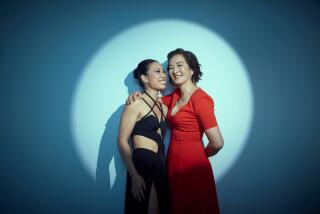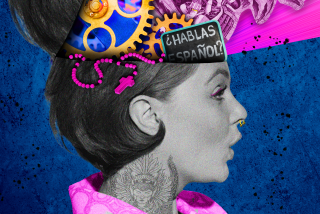Grim Memoir of the Cultural Revolution
- Share via
The grimy streets stink of urine. The shabby houses are as crowded as pigsties. Food is scarce and rancid. Work is literally backbreaking. The neighbors are foul-mouthed and spiteful, but no more so than one’s own family.
The China that Hong Ying depicts in her memoir “Daughter of the River” bears little resemblance to those cheery posters that were churned out by the millions during Mao’s reign, and perhaps even less to the excited reports of Western tourists. Hong, who was born in 1962, lives with her five older siblings (she is called “Little Six”) and her abjectly poor parents in a slummy section of Chongqing, a rough, “disaster prone” city. Her almost relentlessly grim memoir records the events of her 18th year when, she writes, “my world turned upside-down.”
Hong learns crucial things that year--about her family, her sexuality and the politics of her country; what she discovers will lead her both to break with her family and, later, to a successful career as a novelist and poet. Still, she observes, “sometimes, when one strains to bring something hazy into focus, success only invites disaster.”
Hong is haunted by a sense that she is different from--indeed, hated by--her family, in which insults are freely traded and secrets are rife. Of her mother, Hong writes, “What she harboured towards me wasn’t anger, it was loathing.” Hong regards her life’s “most pressing question” as “why I seemed superfluous in this family.”
In fact, the answer to this pressing question is not particularly surprising, and most readers will guess the truth about Hong’s ancestry long before she does. And though Hong’s life is clearly difficult, indeed often miserable, her carping becomes tiresome: “Why, I wondered, was I born into a world where happiness did not exist? Why did I have to experience so many slights, so much negligence and sorrow?” Why, indeed?
What rescues “Daughter of the River” from predictability and self-pity are the fierce, brutal but fascinating historical currents that swirl around Hong and her family. (The personal is political for Hong’s family in ways that most Americans could probably never envision.) Hong’s stubborn mother, for instance, flees an arranged marriage and arrives in Chongqing when it is the Kuomintang capital; her first husband is a gangster who later starves to death in a communist labor camp. Hong herself is conceived during the Great Famine of 1959-61 in which tens of millions died, and the famine indelibly marks not just Hong’s siblings’ resentful attitude toward her, but her own “morose” character as well: “Hunger was my embryonic education.”
But the truly defining event of Hong’s life is the Cultural Revolution, which starts when she is 4 and ends when she is 14. This was not simply a revolution from above, but was embraced with fanatical fervor in streets, schools, factories and homes all over China.
“Families that had split into opposing factions fought like cats and dogs,” Hong writes. “Chongqing would become the most notorious battlefield of the Cultural Revolution. . . . During the first six months of 1967, battles were fought with knives and clubs, but in July, live ammunition began to be used. . . . In Chongqing . . . no fewer than 20 cemeteries were reserved for those who had died.” And it is the Cultural Revolution--with its successive cycles of retribution, purges and suicides--that is central to the life of the Rebel-faction schoolteacher with whom Hong falls in love, and that eventually leads to his destruction.
It is easy--especially from the vantage point of safe, anesthetized America--to romanticize the dramatic sweep of Chinese history. There is enough misery in “Daughter of the River” to mitigate against romance. Hong often stresses the cruelty of her countrymen: There are, she notes sardonically, an awful lot of Chinese, and “superfluous people are ill-disposed to treat others just like them with . . . compassion.”
But Hong’s compatriots also evince resilience, imagination and a fantastically protean energy that can only inspire awe. Hong embodies these qualities, too. Remembering the trashy revolutionary novels on which she was raised, she writes, “I loved the spirit of rebirth among the liberated poor. I was going to be reborn, too.” And in the end, she is.
More to Read
Sign up for our Book Club newsletter
Get the latest news, events and more from the Los Angeles Times Book Club, and help us get L.A. reading and talking.
You may occasionally receive promotional content from the Los Angeles Times.










